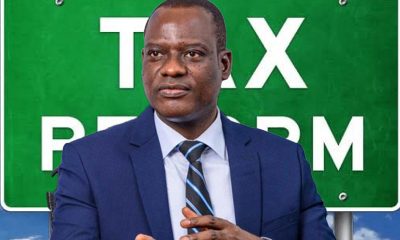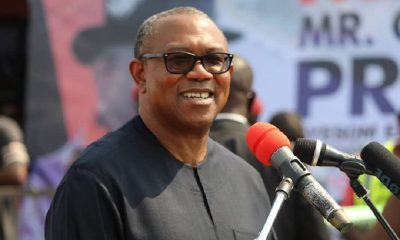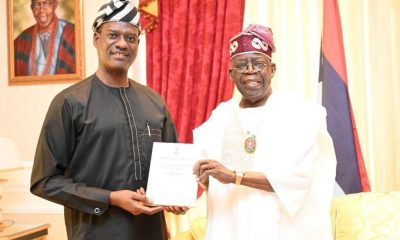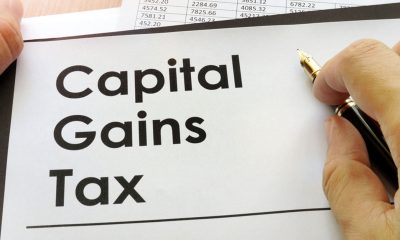General
CAMA 2020 Will Regulate, Not Control Churches, Others—Oyedele

By Dipo Olowookere
The Head of Tax and Corporate Advisory Services at PwC Nigeria, Mr Taiwo Oyedele, has said the aim of the controversial Companies and Allied Matters Act, 2020 (CAMA 2020) especially concerning non-profit organisations, including religious bodies, is to regulate their activities and not to control them as it is being pushed.
The CAMA 2020, which was signed into law recently but is yet to be gazetted, has generated controversies from different quarters, especially from church leaders, who claimed that the law was aimed at controlling the affairs of churches.
Many respected Christian leaders have spoken on the matter, including the founder of Living Faith Church also known as Winners Chapel, Bishop David Oyedepo, who said one of the contending issues was the power given to the registrar general of the Corporate Affairs Commission (CAC) or the supervising minister to tamper with the board of trustee of a charity organisation.
Under CAMA 2020, the commission may by order, suspend the trustees of an association or a religious body and appoint an interim manager or managers to coordinate its affairs where it reasonably believes that there has been any misconduct or mismanagement, or where the affairs of the association are being run fraudulently or where it is necessary or desirable for the purpose of public interest.
But Mr Oyedepo stressed that no government can change the composition of his church’s board, while the Christian Association of Nigeria (CAN) has said the law was an attempt to wage a war against the church in the country.
A few days ago, the General Overseer of the Redeemed Christian Church of God (RCCG), Pastor Enoch Adeboye, was at the Presidential Villa in Abuja for a meeting with President Muhammadu Buhari and it was speculated in some quarters that the respected cleric may have gone there because of the controversial law.
After his meeting with Mr Buhari, the RCCG leader declined to address some anxious journalists waiting for him outside.
On Wednesday, September 2, 2020, PwC organised a capability enhancement workshop for journalists and one of the speakers, Mr Taiwo Oyedele, spoke on the new CAMA 2020 law.
He pointed out that the law was not intended to control charity organisations, which religious bodies belong, but mainly to regulate their activities.
He said it was normal for any responsible government to regulate activities of any organisation that collects funds from members of the public, who must be protected.
Mr Oyedele also said the new law was the most important business regulation in Nigeria especially as it has a significant impact on doing business, competitiveness, attracting investments, and economic growth.
However, he stressed the need to gazette the CAMA 2020 with a future commencement date to facilitate ease of transition while emphasising the importance of effective implementation.
He noted the need to harmonise CAMA with other laws such as the Companies Income Tax Act which still requires audited accounts by all companies regardless of size.
In addition, more flexibility is required for foreign companies who wish to operate a business in Nigeria such that a branch registration should be permitted while incorporating a subsidiary will be optional, he posited.
According to the tax expert, it is also necessary to ensure that the new law is kept under constant review with more frequent amendments or re-enactment say every five years.
Also speaking at the event attended by over 100 financial journalists, including from Business Post, the Editor-in-Chief at Stears Business, Mr Tokunbo Afikuyomi Jr, highlighted the impact of the COVID-19 pandemic on news consumption patterns and what this means for the fortunes of journalists and their media houses.
He noted that in times of uncertainty, trustworthy reporting becomes even more important than the speed to break the news, noting that with the shift to digital platforms by consumers, reporters must balance the rush to be the first to publish with providing factual information written from a unique angle that adds value to the readers. He also emphasised the need for clarity of thoughts and clarity of expression for excellent reporting.
On his part, the Partner and Chief Economist at PwC Nigeria, Mr Andrew Nevin, tasked business journalists to add more value to their reporting.
He lamented reproduction of economic data from agencies without providing sufficient context or insights, urging reporters to track key metrics such as the Sustainable Development Goals (SDGs) and other policy pronouncements of governments which they can use to benchmark their analysis of NBS statistics and enrich their general reporting on the economy.
General
Nigerian Bottling Company Bridges Education, Employability Gap

By Modupe Gbadeyanka
The Nigerian Bottling Company (NBC) has reaffirmed its determination to bridge the gap between education and employability in the country by sustaining its flagship Youth Empowered (YE) programme.
This initiative provides hands-on learning, real-world insights, and access to career-shaping opportunities to young Nigerians.
The 2026 edition of the scheme commenced on February 2 at the University of Lagos (UNILAG), with participants mainly young people between the ages of 16 and 35.
A statement from the organisation said this year’s rollout will expand to more tertiary institutions, including the Federal University of Technology, Akure (FUTA). This follows a successful 2025 tour that reached seven cities across the country, including Makurdi, Jos, Benin, Kaduna, Asaba, Akure, and Port Harcourt.
Participants in the 2026 programme will receive training across key modules designed to support personal, professional, and business growth, including Business Life Skills, Adaptability and Resilience, Financial Literacy, Customer Service and Communication, Sales and Negotiation Skills, and Workplace Ethics.
The sessions will also feature breakout workshops on Business Planning, Project Management, and Time Management, alongside the Director’s Grant Pitch Competition, where participants can pitch their ideas for a chance to win business funding.
In addition to skills development, NBC’s People and Culture team will be present throughout the programme to identify outstanding talent for future opportunities within the organisation, further strengthening the connection between learning, employment, and long-term career growth.
One of the participants at the UNILAG training, Waliat Adedogun, who received a cash grant through the Director’s Grant Pitch Competition to support her small business, said: “Youth Empowered gave me more than training; it gave me clarity and confidence. Winning the grant means I can finally take my business idea from a dream into something real. I now feel prepared to build, grow, and create opportunities not just for myself, but for others too.”
Since its launch in 2017, the scheme has impacted more than 70,000 young Nigerians, equipping participants with practical skills, confidence, and exposure needed to succeed in today’s dynamic workplace and entrepreneurial landscape.
This year’s programme is being delivered in collaboration with Fate Foundation as the implementing partner, with funding support from The Coca-Cola HBC Foundation.
Last year, 10 beneficiaries were selected for six-month paid internships across NBC locations in Lagos, Ibadan, Asejire, and Challawa, gaining direct industry exposure.
Additionally, three outstanding participants received sponsorship for an all-expenses-paid intensive culinary training programme and were awarded N1 million each to support the launch of their businesses.
General
INEC Fixes February 20 for 2027 Presidential, NASS Elections

By Modupe Gbadeyanka
The 2027 presidential and National Assembly elections will take place on Saturday, February 20, the Independent National Electoral Commission (INEC) has revealed.
In a notice for the 2027 general polls issued on Friday, the electoral umpire also disclosed that the governorship and state assembly elections for next year would be on Saturday, March 6.
Speaking at a news briefing in Abuja today, the chairman of INEC, Mr Joash Amupitan, expressed the readiness of the commission to conduct the polls next year, which is 12 months away.
The timetable issued by the organisation for the polls comes when the federal parliament has yet to transmit the amended electoral bill to President Bola Tinubu for assent.
This week, the Senate passed the electoral bill, reducing the notice of elections from 360 days to 180 days, while the transmission of results was mandated with a proviso.
Recall that on February 4, INEC said it was ready to go ahead with preparations for the elections despite the delay in the passage of the amended electoral law of 2022.
General
NGIC Pipeline Network to Experience 4-Day Gas Supply Shortage

By Modupe Gbadeyanka
The pipeline network of the NNPC Gas Infrastructure Company Limited (NGIC) will witness a temporary reduction in gas supply for four days.
This information was revealed by the Chief Corporate Communications Officer of the Nigerian National Petroleum Company (NNPC) Limited, Mr Andy Odeh, in a statement on Thursday night.
A key supplier of gas into the NGIC pipeline network is Seplat Energy Plc, a joint venture partner of the state-owned oil agency.
It was disclosed that the facility would undergo routine maintenance from Thursday. February 12 to Sunday, February 15, 2026.
The NNPC stated that, “This planned activity forms part of standard industry safety and asset integrity protocols designed to ensure the continued reliability, efficiency, and safe operation of critical gas infrastructure.”
“Periodic maintenance of this nature is essential to sustain optimal system performance, strengthen operational resilience, and minimise the risk of unplanned outages,” it added.
“During the four-day maintenance period, there will be a temporary reduction in gas supply into the NGIC pipeline network. As a result, some power generation companies reliant on this supply may experience reduced gas availability, which could modestly impact electricity generation levels within the timeframe.
“NNPC Ltd and Seplat Energy are working closely to ensure that the maintenance is executed safely and completed as scheduled. In parallel, NNPC Gas Marketing Limited (NGML) is engaging alternative gas suppliers to mitigate anticipated supply gaps and maintain stability across the network,” the statement further said.
“Upon completion of the maintenance exercise, full gas supply into the NGIC system is expected to resume promptly, enabling affected power generation companies to return to normal operations,” it concluded.
-

 Feature/OPED6 years ago
Feature/OPED6 years agoDavos was Different this year
-
Travel/Tourism10 years ago
Lagos Seals Western Lodge Hotel In Ikorodu
-

 Showbiz3 years ago
Showbiz3 years agoEstranged Lover Releases Videos of Empress Njamah Bathing
-

 Banking8 years ago
Banking8 years agoSort Codes of GTBank Branches in Nigeria
-

 Economy3 years ago
Economy3 years agoSubsidy Removal: CNG at N130 Per Litre Cheaper Than Petrol—IPMAN
-

 Banking3 years ago
Banking3 years agoSort Codes of UBA Branches in Nigeria
-

 Banking3 years ago
Banking3 years agoFirst Bank Announces Planned Downtime
-

 Sports3 years ago
Sports3 years agoHighest Paid Nigerian Footballer – How Much Do Nigerian Footballers Earn





















